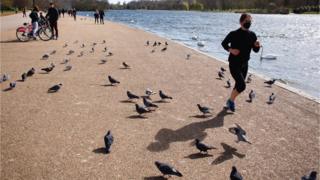 Image copyright
Getty Images
Image copyright
Getty Images
The UK's coronavirus restrictions will last until "at least" 7 May, according to the government.
Meanwhile, some parts of the UK have been tightening the rules on exercise.
What is a 'reasonable excuse' to go out?
The measures in place say people should go out as little as possible and only leave home if they have a "reasonable excuse". This includes:
- Exercise - alone, or with members of your household
- Shopping for basic necessities
- Any medical need, or providing care for a vulnerable person
- Travel to or from work, but only when you cannot work from home
Police also have wide-ranging powers to help fight coronavirus by enforcing the social distancing measures. They have been issued guidance about what might be "reasonable" and "unreasonable" excuses for people leaving their homes.
What are the rules on exercise?
If you have to go outside you should stay more than 2m (6ft) apart from anyone other than members of your own household. This is what's known as social distancing.
No mention is given to how long you can exercise for. But Cabinet Office minister Michael Gove has suggested a walk of up to an hour, a run of 30 minutes or a cycle ride of between the two might be appropriate for most people.
In Wales the rules say you can exercise for a reasonable amount of time and that means four or five hours is out of the question.
Can I sunbathe in the park?
Some public parks in London were temporarily closed following lockdown. But the government has now told councils that parks should remain open.
Why is social distancing necessary?
Social distancing is important because coronavirus spreads when an infected person coughs small droplets - packed with the virus - into the air.
These can be breathed in, or can cause an infection if you touch a surface they have landed on, and then touch your face with unwashed hands.
What is self-isolation?
If you show symptoms of coronavirus - such as a dry cough and high temperature - you must take extra precautions.
You should stay at home and not leave it for any reason. .
This is known as self-isolation.
You should not go out even to buy food or medicine, and should order them online or ask someone to drop them off at your home for you.
You can use your garden, if you have one, and any exercise should be taken at home.
Who should self-isolate?
Everyone who shows coronavirus symptoms - a fever of above 37.8C, a persistent cough or breathing problems - and everyone who lives in the same house or flat as someone with symptoms.
- If you live alone, you must stay at home for seven days from the day symptoms start
- If you still have a high temperature after seven days, you must continue to self-isolate until your temperature returns to normal
- However, you do not need to continue to self-isolate if you only have a cough after seven days (that's because a cough can last for several weeks after the infection has gone)
- If you, or someone you live with, develop symptoms, the entire household needs to isolate for 14 days to monitor for signs of Covid-19
- If someone else does become ill during that period, their seven-day isolation starts that day. For example, it might run from day three to day 10 - when that person's isolation would then end. It would not restart if another member of the household fell ill
- But anyone who fell ill on day 13 would have to start a separate seven-day isolation from that day (meaning they would spend a total of 20 days at home)
- If you have previously tested positive for Covid-19, you and your household do not need to self-isolate if your symptoms remerge. That's because, according to the government, anyone who has previously tested positive for Covid-19 will probably have immunity to the disease
The person with the symptoms should stay in a well-ventilated room with a window that can be opened, and keep away from other people in the home.
People are being advised not to ring NHS 111 or their GP to report their symptoms unless they are worried.
Who shouldn't go out at all?
About 1.5 million people with very serious health conditions are being contacted by the NHS and urged not to go out at all for at least 12 weeks.
This is what's known as shielding.
The most vulnerable group includes:
- Certain types of cancer patients
- Organ transplant patients
- People with certain genetic diseases
- People with serious respiratory conditions such as cystic fibrosis and severe chronic bronchitis
- People receiving certain drug treatments which suppress the immune system
- Pregnant women with heart disease
The government says it will work with local authorities, supermarkets and the armed forces to ensure they get supplies of essential food and medicines.
Others in the same household, and carers, can go out as long they observe proper social distancing.